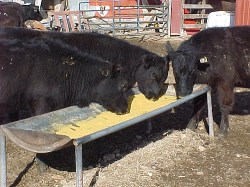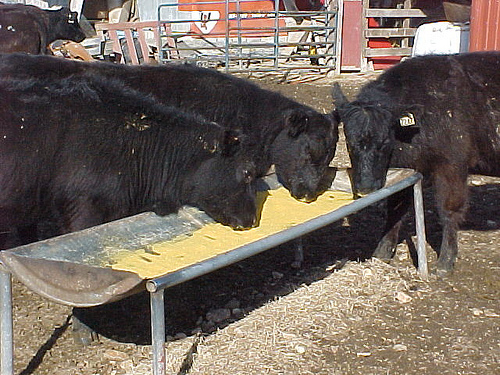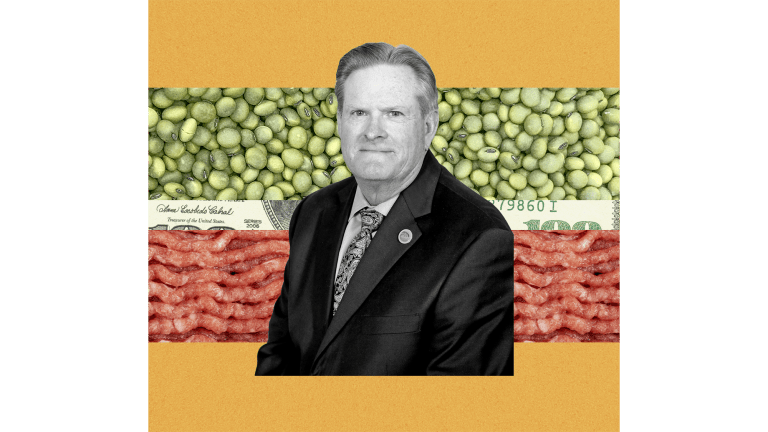
Photo by the University of Missouri Extension.
It seems like everywhere we turn, there’s more evidence of industrial agriculture’s reckless use of antibiotics. The latest example: antibiotics in ethanol production.
As we reported recently here on Grist, this isn’t just a waste of important medicines. It may also contribute to the rise of antibiotic-resistant bacteria. And that’s because the main by-product of the ethanol production process, the leftover corn mash known as distillers grains, has become a major ingredient in animal feed over the last decade. More than 30 million metric tons of the made-in-the-USA stuff are fed to beef cattle, dairy cows, and pigs here and abroad every year.
While the Food and Drug Administration (FDA) does not track exact figures, meaning there’s no way to know exactly how much is used, the agency’s own research has shown antibiotics like penicillin and erythromycin, which are important for human medicine, at detectable levels in distillers grain. A 2010 study by the FDA’s Center for Veterinary Medicine found enough erythromycin present in samples of the distillers grains it tested to cause resistance to develop in certain bacteria — compelling evidence that the risks of using antibiotics to make ethanol are real.
But the Institute for Agricultural and Trade Policy (IATP), an organization working to reduce the use of antibiotics in agriculture, just released a report [PDF] that adds another twist to this story. The IATP makes the claim that pharmaceutical companies, who are selling antibiotics to ethanol producers, may be doing so illegally.
The argument they make is simple — by law, the FDA is required to regulate antibiotics for use in ethanol as a “food additive,” which comes with a very specific set of approvals and protocols, including the requirement that pharmaceutical companies apply for permission to sell them. But they haven’t applied for that permission. Instead, the pharmaceutical companies are operating under the presumption that their products are considered GRAS, the acronym for substances the FDA considers “Generally Regarded as Safe” and thus can be used freely in food or feed production.
The FDA maintains a list of GRAS substances, which includes most spices, flavorings, vitamins, and additives like specific preservatives and anti-caking agents. The GRAS protocol is designed as a way to make it easier for companies to process food without having to apply for permission to use common ingredients. However, it’s a bit of a stretch to argue that antibiotics that end up in livestock feed should qualify for treatment like that — and there are strong indications that the FDA doesn’t agree with these companies’ presumptions.
The most compelling evidence the IATP provides comes from the FDA Center for Veterinary Medicine (CVM) 2008 annual report, which states:
In 2008, CVM worked with the Environmental Protection Agency to clarify the respective roles of the agencies with regard to regulatory jurisdiction over the use of antibiotics during fuel ethanol production. FDA regulates distiller byproducts from both potable and fuel ethanol production when the byproducts are used as animal feed and/or feed ingredients, regulating antibiotic residues as food additives [emphasis mine].
That seems fairly cut and dried. Yet drug companies continue to treat antibiotics for ethanol as if no FDA approvals are required. What’s unclear, however, is who’s truly at fault. The IATP report presents evidence that the drug companies are aware of FDA’s official position on antibiotics in ethanol. And, according to the IATP, at least two drug manufacturers have indeed submitted “food additive petitions” for their antibiotic products to be sold to ethanol makers.
But at the same time, the FDA appears to be sitting on its regulatory hands. It certainly hasn’t demanded these companies stop selling unapproved antibiotics to ethanol producers. When I contacted the CVM and asked them to shed some light on the confusion, a spokesperson wrote that the CVM has taken steps to determine the impact of the use of antibiotics in ethanol production facilities and said that it “intends to provide further clarification in the near future.”
When I pressed her on the question of whether antibiotics in ethanol production are definitively regulated as food additives or not, the spokesperson wouldn’t directly confirm or deny the position. However, she did reply that:
“FDA makes a determination about whether a substance is a food additive on a case-by-case basis. Food additives can only be legally marketed if they are the subject of an approved food additive petition. If FDA publishes a food additive regulation, anyone can market the food additive if they comply with that regulations.”
When combined with the clear language of the CVM’s own annual report, the above statement strongly indicates that any time a drug company wants to sell antibiotics for use in ethanol production it needs to file a food additive petition. But only three such documents appear to have been filed — and the FDA has approved none of them. So it does appear to be the case that these drug manufacturers are violating the law. But then, I’m no lawyer.
Whatever the case, with the FDA unwilling to take a firm stand, the issue remains in a kind of legal limbo. And like nature with a vacuum, industry loves a limbo. So, while the FDA considers and studies, the flood of antibiotics into ethanol plants — and ultimately into the stomachs of millions of meat and dairy cows all over the country — continues.




